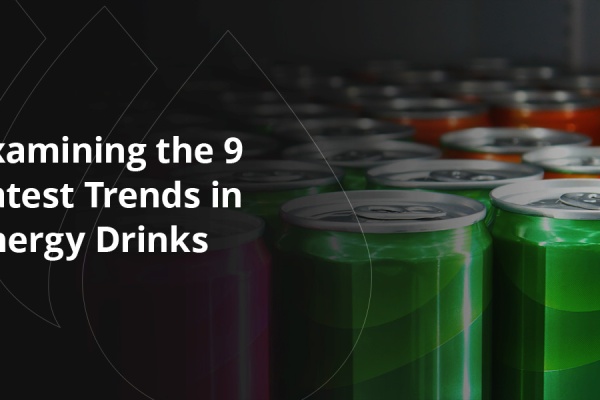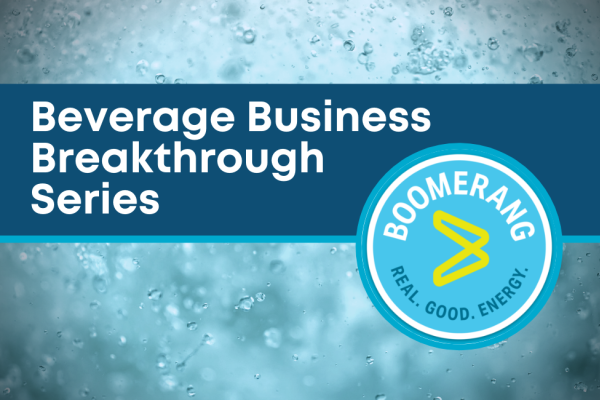Top Energy Drink Ingredient Trends in 2024
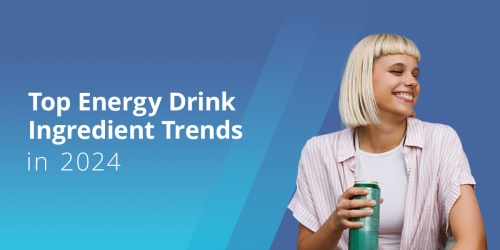
The energy drinks market is booming, with 33% of respondents aged 18-29 and 36% of people aged 30-49 stating they drink them regularly. The consumption of energy drinks has increased and will likely continue to grow as consumers express interest in options with natural and functional ingredients.
Current energy drink trends are less about novel ingredients and more about application. They're not mutually exclusive — many overlaps and combinations exist to develop the ideal beverage for the current market. Today, consumers are looking for natural drinks that layer on complementary functional ingredients to target their specific energy requirements. They seek something specific to them and their needs, whether those are increased focus, endurance and recovery in sports and fitness or even reaction time in gaming. Innovative brands must think creatively and look beyond traditional energy drink ingredients to ride the wave of the 2024 trends and meet consumer demands for diversity.
Power Up in 2024: Top Energy Drink Ingredient Trends
The world of energy drinks is constantly changing and buzzing with innovation. Healthy lifestyles are a driving force behind this ever-evolving market. Consumers are demanding healthier energy drink options with a functional twist. The market is experiencing unprecedented growth as beverage brands nationwide take up this gauntlet and respond to consumer needs with exciting new applications of functional and natural ingredients.
The exciting market expansion provides more opportunities than ever to launch an energy drink that leverages current trends. The trick is to know which trends carry the most weight for consumers. Here's a peek at what's hot in the world of energy drinks for 2024.
1. Natural Is the New Buzz
Consumers are more aware than ever of what they put in their bodies. Energy drinks laden with artificial stimulants are a thing of the past. Instead, consumers have increasingly stringent health and wellness demands, and they seek natural and functional ingredients. This increased awareness translates to a rise in plant-based caffeine sources like green tea extract, coffee bean extract, guayusa and guarana.
As more consumers focus on their wellness and physical health, there has been a distinct increase in physical activity, and consumers want energy drinks that help them achieve their physical goals. While they're looking for added caffeine in some cases, consumers also want to remove certain ingredients from their diets, including sugar and artificial sweeteners.
Beverage brands must think outside the box to meet consumers' demands for healthier energy drinks that still deliver on taste. To do so, they are expanding flavor profiles and ingredient formulations. From traditional flavors to more adventurous combinations, innovation is key to capturing the diverse preferences of today's consumers.
Historically, energy drinks have faced consumer resistance due to their association with synthetic ingredients, including caffeine, artificial colors, sweeteners and preservatives. However, the emergence of natural energy drinks has challenged this negative perception. By offering clean energy without artificial chemicals and with transparent labeling, these beverages appeal to health-conscious consumers, including those who previously avoided energy drinks altogether.
This growing demographic, which notably includes a significant number of women, is drawn to the natural claims and healthier images of these products. This trend will likely stay long-term as consumers remain interested in fueling their bodies with healthy energy alternatives.

2. Functional Focus
Energy drinks are about more than a quick pick-me-up in 2024. Expect a rise in targeted functional ingredients as consumers seek more personalized options. For example, creatives may favor nootropic options for added focus and concentration. Athletes make up a substantial segment of the energy drink market, and energy drinks are a popular pre-workout option for them. Some energy drink brands have added amino acids to make them more appealing to lifestyle and sports-performance consumers. For example, Zoa Strawberry Watermelon contains branch chain amino acids (BCAAs) that are known to support muscle recovery and improve stamina. Their ability to reduce feelings of soreness and improve post-workout recovery makes them attractive to athletes and fitness enthusiasts.
Physical health is only one side of the coin. Consumers want functional beverages that improve their cognitive health. Adaptogens and nootropics are coming to the fore, offering cognitive and health benefits. The latest trends speak to more experimentation and innovation with functional ingredients, incorporating benefits such as stress reduction and improved mental performance.
The World Health Organization's emphasis on the health benefits of functional foods and drinks has partly driven the consumer's quest for ingredients that support their personalized goals. Functional beverages contain bioactive compounds like phenolic compounds, vitamins, minerals and peptides that can do more than impact consumers' ability to work out or focus. They also have significant long-term health benefits, from providing digestive benefits to incorporating micronutrients into consumers' daily diets.
Combining functional and energy drinks is an exciting opportunity for the beverage market. It allows them to meet consumer needs for healthy alternatives and natural flavors while providing an extra energy boost. Natural ingredients are a trend that permeates every corner of the beverage market.
3. Caffeine Alternatives
Caffeine is a key ingredient in many energy drinks, and 94% of adults in the United States drink caffeinated beverages. However, caffeine alternatives are emerging due to increased consumer interest in alternative energy sources. Look for energy drinks featuring ingredients like adaptogenic mushrooms and galanga for sustained energy and potential physical and mental benefits.
Despite caffeine's many benefits, many consumers are looking to skip the side effects, from anxiety to sleep interruptions. Many looking to limit caffeine still want the benefits, opening the door for beverages that use other ingredients to deliver the same experiences. Brands combining caffeine alternatives with other functional benefits can appeal to a new market.
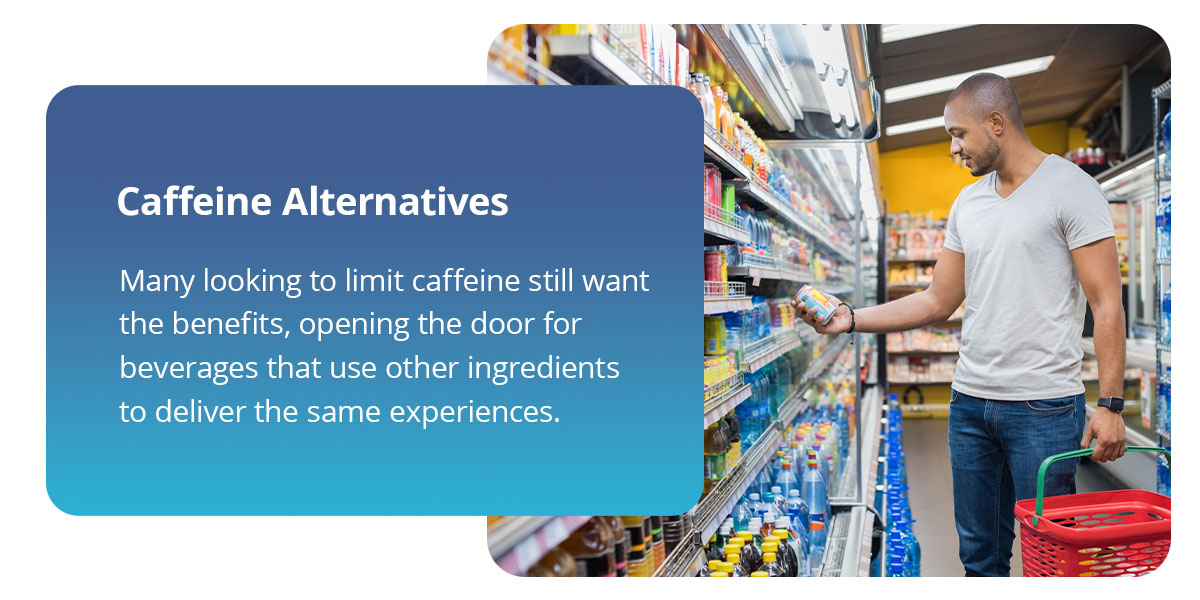
Sleep is a cornerstone of general well-being and good health, which presents an exciting challenge for the energy drinks industry. In response to demands for energy drinks with moderated caffeine content, ingredients such as paraxanthine and various vitamins and minerals replace caffeine. Matcha is also a popular alternative, hailed for its slow-release energy.
Natural sources of caffeine with functional health benefits meet multiple consumer demands, allowing consumers to meet various needs in one efficient and tasty beverage. With clean labels and functional benefits at the forefront of consumer preferences, brands can eliminate the health risks associated with caffeine and other artificial stimulants. Instead, they can focus on ingredients like yerba mate, guayusa leaf and green tea, which increase natural caffeine intake and provide antioxidant benefits.
Aside from the potential health implications of excessive caffeine, consumers want to avoid the associated restlessness and anxiety, which can be counterproductive. Brands incorporate ingredients like AmaTea® Max and L-theanine to provide energy without causing the jitters.
Many brands are also climbing aboard the vitamin B12 trend. B12 is an essential vitamin that helps convert protein and fat into energy. While B12 shots have been a staple for many, the vitamin is making waves in the beverage industry. It provides a quick and effective energy boost that consumers can easily integrate into their daily lives.
4. Minimal Side Effects
Consumers are asking what else energy drinks can do for them. They actively seek energy drink alternatives that deliver more than just an energy boost. Electrolytes and B vitamins are gaining traction for their role in energy production and nervous system function. Some products focus on protein for energy, while others look at metabolism modulation, vitamins, minerals or electrolytes. For example, Vuum released a plant-based energy drink comprising natural caffeine, amino acids, vitamins and minerals.
While energy drinks were often traditionally associated with sports, they can fuel more lifestyles, hobbies and professions, a key avenue for beverage brands. Adding ingredients that help in areas like mental agility, clarity, stress relief and muscle recovery means experimenting with primary ingredients beyond caffeine to get the same results — or better ones.
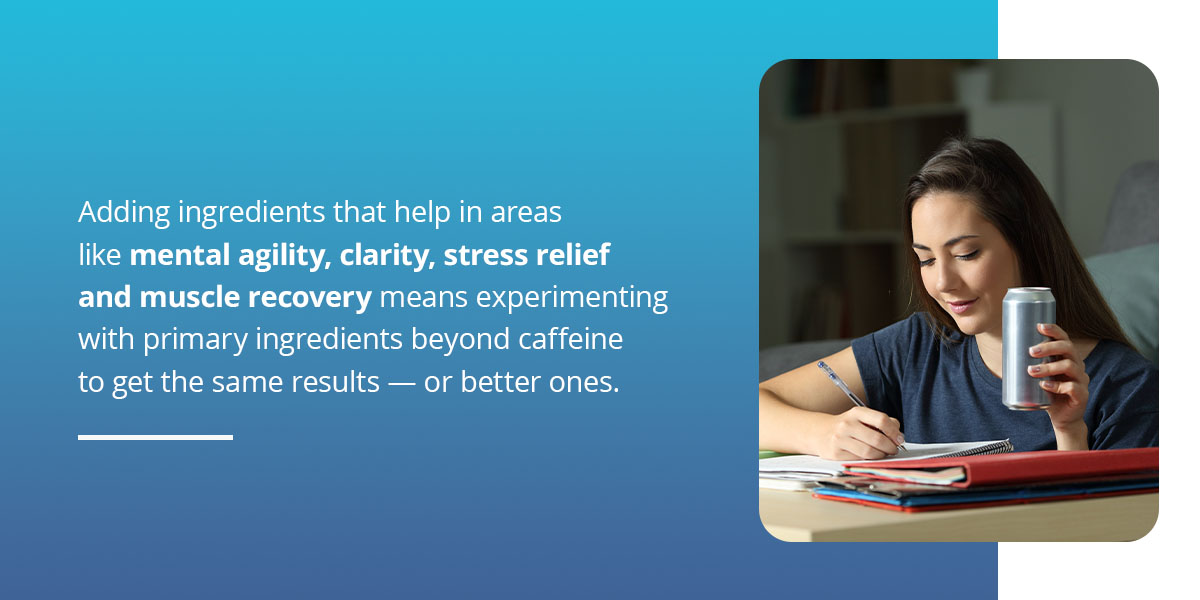
Similarly, consumers are moving away from a short-term energy boost and the associated side effects and looking for energy products that tackle many mental and physical challenges throughout the day with sustained energy. Expanding ingredient lists also opens up the market for more significant innovation for many target markets. If they find products that speak to their sustained energy needs without the side effects, students, professionals and even stay-at-home moms will likely migrate to the market.
5. Gamer Energy
The eSports industry is booming, with 188.9 million gamers in the U.S. alone, and energy drink companies are noticing. Alongside many other diversified markets, expect a rise in "gamer fuel," specifically formulated to meet professional gamer needs. These drinks may feature ingredients to improve focus, reaction time and even eye health. Common ingredients include lutein, zeaxanthin, choline, bacopa monnieri, sage and L-theanine. Many gamers also prefer low- or no-sugar options to prevent crashing.
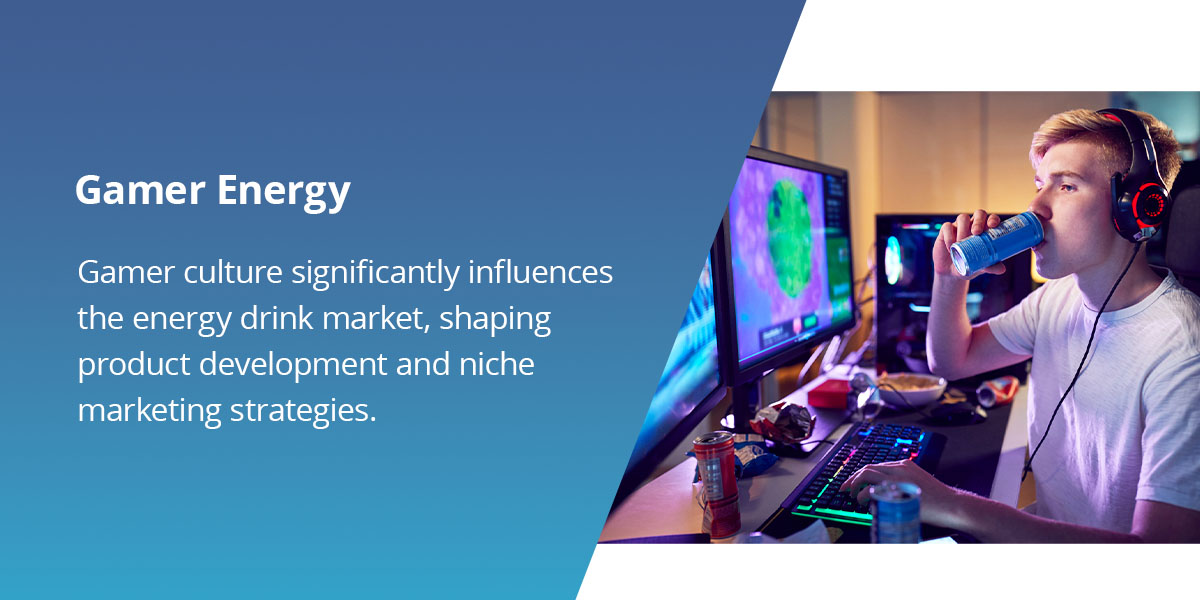
Gamer culture significantly influences the energy drink market, shaping product development and niche marketing strategies. Over time, gamer preferences have changed. Brands are incorporating nootropics and essential vitamins. They're also experimenting with different flavors to appeal to the younger market.
While gamer drinks are a niche segment in the energy drink market, they're growing in popularity. Younger generators are the target consumers, and formulating energy drinks for their unique needs involves building authentic relationships within the gaming community. Gamers use energy drinks in the same way as athletes use pre-workout beverages in their training routines. They also form a community and are quick to recommend energy drinks online.
6. Ethically Sourced Ingredients
Sustainability is an overarching trend in the beverage market, with many consumers expressing concerns about the environmental impact of product packaging. However, product packaging is only one part of the equation. Many of today's consumers are as worried about ingredients and manufacturing practices. They want to feel good about what they buy beyond contributing to their health.
Many brands seek ways to minimize waste, emissions, and energy and water consumption. Many opportunities exist to boost sustainability in beverage manufacturing, and leveraging these is essential in appealing to an environmentally conscious target market.
The energy drink market is abuzz with new designs and sustainable packaging. More brands are showcasing their commitment to environmentally friendly practices while presenting their beverages as sustainable alternatives for the modern consumer. In addition to packaging, many brands adopt sustainable practices throughout the supply change, including ethical sourcing of ingredients. These efforts assist in meeting sustainability goals but also enhance brand image and appeal to another niche in the energy drink market.
Trending Ingredients in Today's Energy Drinks
In line with the aforementioned energy drink trends, certain ingredients are becoming increasingly popular to meet consumer needs. Some of the trending energy drink ingredients in 2024 include:
- L-theanine: L-theanine is a natural amino acid found in tea leaves. Combined with caffeine, it's a popular option for nootropic energy drinks because it boosts focus and mood and provides a sustained source of energy. It increases the production of alpha brain waves, which helps to counteract some of caffeine’s negative side effects such as anxiety, jitters or the caffeine crash.
- Ashwagandha: Ashwagandha is a medicinal herb that reduces stress and anxiety, improving the body's resilience during stressful events. While stress relief may sound counterintuitive for an energy drink, reducing stress can make people feel energized and focused as they expend less mental energy dealing with negative environmental influences.
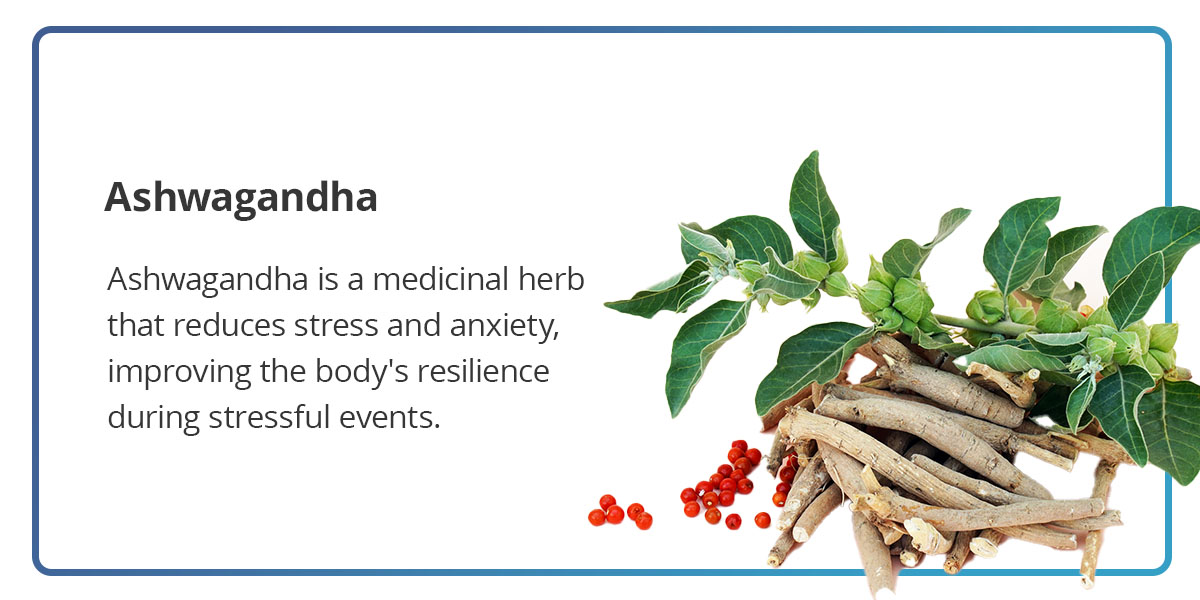
- Tumeric: A common natural ingredient, turmeric is likely to appear in more energy drink formulations. It's a robust anti-inflammatory — some research indicates it can reduce mental and physical fatigue.
- Ginger: This potent root is prized in many beverage formulations due to its distinctive flavor. Alongside the popular fiery sensation, ginger is a powerful anti-inflammatory and antioxidant. Some studies show that black ginger improves endurance by increasing energy metabolism.
- Lemon balm: This versatile herb is a member of the mint family. Like ashwagandha, it's considered a calmative and is often associated with sleep. It reduces stress and anxiety, and when it forms part of an energy drink formulation, it allows consumers to stay focused while working through high-stress tasks.
- Chamomile: Chamomile is a versatile herb with many health benefits. It's an antioxidant and calmative that works with caffeine and other stimulants to slow the onset of the energy boost and provide a sensation of calm focus.
- Rhodiola rosea: This dynamic plant has been used for many years to treat anxiety, fatigue and depression. It helps with stamina and concentration and synergizes with caffeine to improve muscle strength and endurance and increase energy availability throughout the day, lowering anxiety and promoting restful sleep at night.
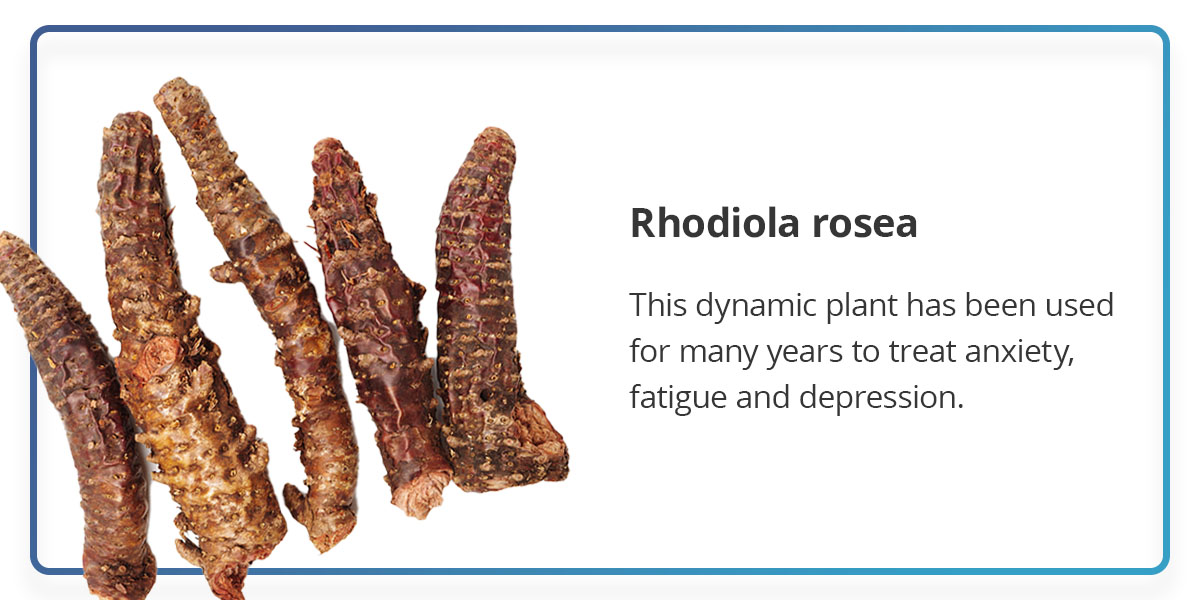
- Panax ginseng: Ginseng is a potent herb with many physical and mental benefits. It improves memory and mental acuity and is a common natural ingredient in energy drinks. It contains antioxidants, fights fatigue and boosts energy levels.
- Electrolytes: Magnesium is a mineral that can help replenish electrolytes lost when you sweat, making it a common ingredient in sports energy drinks. It also helps nerves and muscles function, fights fatigue, improves mental acuity and has many other health benefits.
- Acerola: Acerola is a berry often used as a home remedy for various ailments. It's rich in antioxidants and vitamin C, boosting the immune system. These berries are also a source of plant compounds called anthocyanins, which are neuroprotective. They help protect the brain from oxidative stress, boosting overall health. They also have a sweet, slightly acidic taste — a popular choice among many beverage consumers.
- Vitamin C: Adding vitamin C to energy drinks boosts the existing content from acerola and helps the beverage last the intended shelf life. As a potent antioxidant, it supports the immune system and helps reduce fatigue.
- Vitamin D2: While vitamin D3 is only found in animal-based sources, vitamin D2 comes from plant-based sources, making it an ideal ingredient for natural and vegan beverages. Research shows it may regulate mood, reduce depression and promote healthy immune system function.
- Vitamin B5: This multipurpose B vitamin has many health benefits, including promoting healthy nervous system functioning and oxygenating the body, which is crucial for sustained energy and stress management.
- Vitamin B12: This is a prevalent ingredient in energy drinks due to its ability to nourish the brain and energize the body. It may also improve mood and alleviate the symptoms of depression.
- Vitamin E: Vitamin E is a powerful antioxidant with many benefits for the brain and skin. It can also reduce heart disease risk factors.
- Beta-carotene: Beta-carotene has a vibrant natural pigment that makes beverages more appealing to consumers. It also boosts the immune system and contributes to skin and eye health, making it an ideal ingredient for gamer drinks.
- Acacia fiber: Made from the natural exudate of the acacia tree, this dietary fiber improves overall digestion and provides several mood benefits linked to gut health.
- Reishi: The reishi mushroom has many immune-boosting benefits and could reduce fatigue and depression.
- Lion's mane: Fungi like reishi and lion's mane are becoming popular in functional beverages. Lion's mane mushrooms contain bioactive compounds that stimulate brain cell growth and keep the mind focused, making them ideal for people who want to stay focused for long periods. They also relieve the symptoms of depression and anxiety.
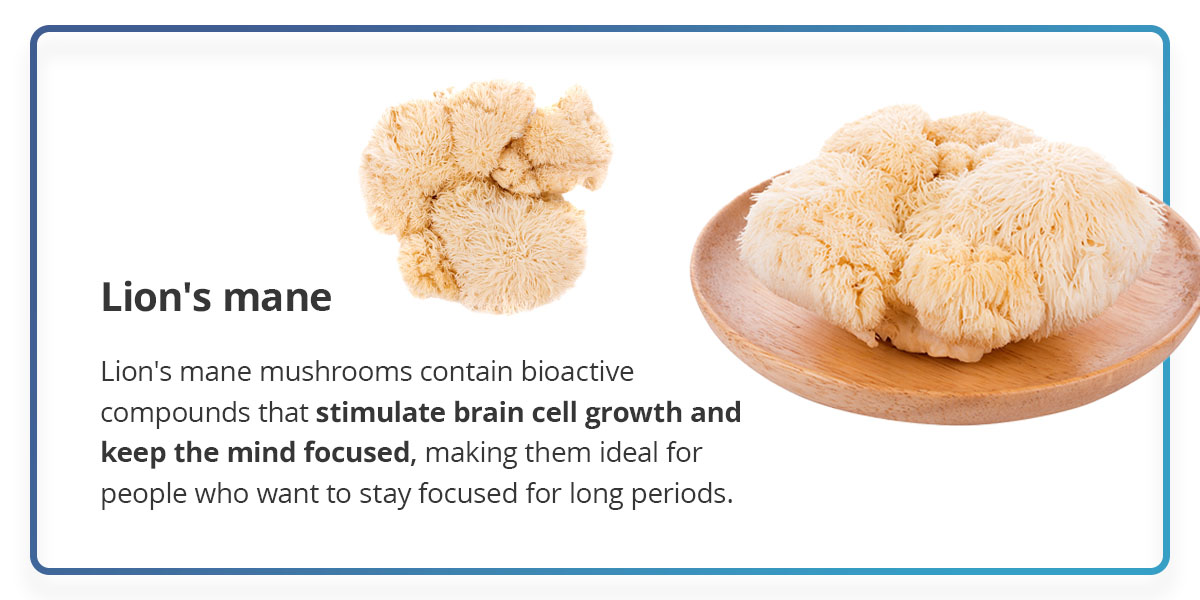
- CBD or hemp: CBD and hemp energy drinks are popular for helping reduce stress and creating a sense of calm focus. They also have anti-inflammatory benefits.
The General Trend Toward Nootropics and Adaptogens
Nootropics and adaptogens are a rising trend, fast becoming a hub of innovation within the beverage market. Many consumers prefer beverages as their delivery systems for functional ingredients that boost focus and reduce stress. Nootropic beverages are formulated to enhance cognitive performance, focusing on memory, attention, creativity and motivation. In contrast, adaptogens are substances that help the body adapt to stress. They play a significant role in reducing anxiety and promoting a sense of calm well-being.
When combined, nootropics and adaptogens can help consumers enjoy enhanced focus and cognitive performance while staying calm in the face of stress. Energy drinks are often the perfect vessels to deliver these benefits, appealing to the athletic, creative, professional and gaming markets. As the energy drink market diversifies, it presents an exciting opportunity to incorporate nootropics and adaptogens, combining energy support, cognitive health and stress relief.
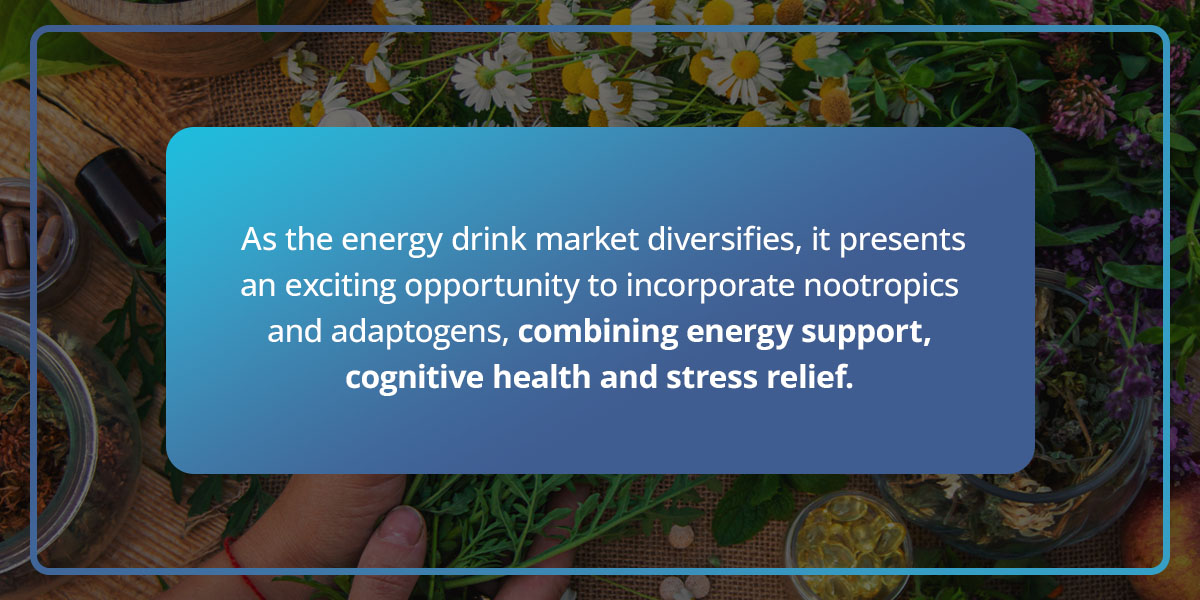
Energy Drink Ingredients Falling Out of Favor
When new trends enter the market, old ones must move aside to make space. Some common ingredients in the energy drinks of the past are falling out of favor as consumer demands change:
- Taurine: While not entirely out of the picture, consumers and brands are questioning taurine's role in the energy drinks of the future. Studies on its benefits show mixed results, and consumers are looking for more transparent labeling and ingredients with proven results.
- Guarana: Guarana is on the fence in 2024. While it is still a trending ingredient, there's a definite move toward using it in lower doses. It has potent stimulating effects, and brands are focusing on a more balanced energy experience.
- Proprietary blends: Consumers are more wary than ever about what they ingest, demanding complete transparency about their energy drink ingredients. Large, undisclosed, "proprietary blends" are falling out of favor, as fewer consumers are comfortable buying beverages unless they know what ingredients they're consuming.
Ride the Latest Energy Drink Wave With BevSource
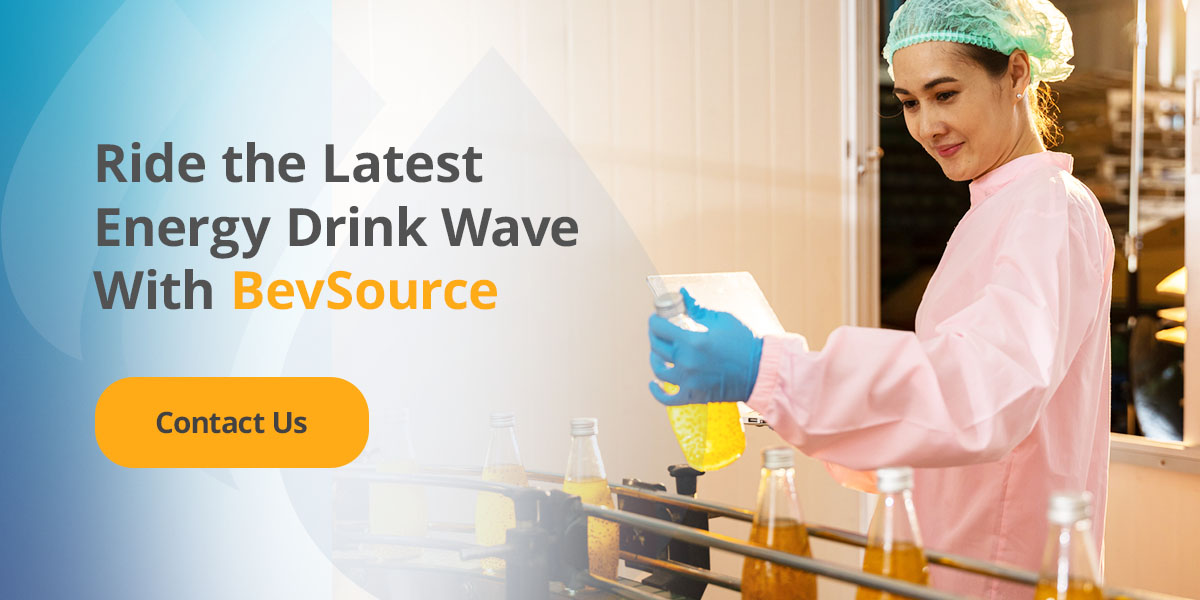
With many energy drink trends to explore, beverage brands have countless opportunities to meet diverse consumer demands. The latest trends for natural, multipurpose and targeted beverages paves the way for creativity in ingredients and formulations, expanding into new markets and reinventing existing ones. Do it right the first time with BevSource.
BevSource can support you through your brand throughout every stage of product development, from sourcing ingredients to formulating groundbreaking beverages and taking them to market. As an extension of your team, we'll leverage our considerable expertise and industry connections to make your dreams a reality. Let's chat. Reach out to us and speak to a beverage expert today!

